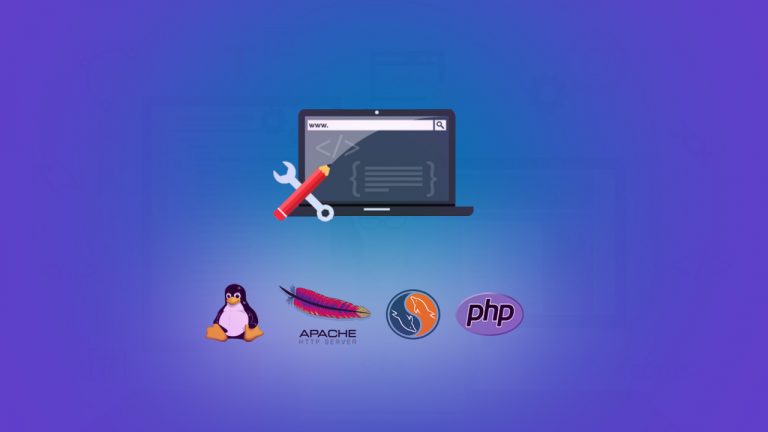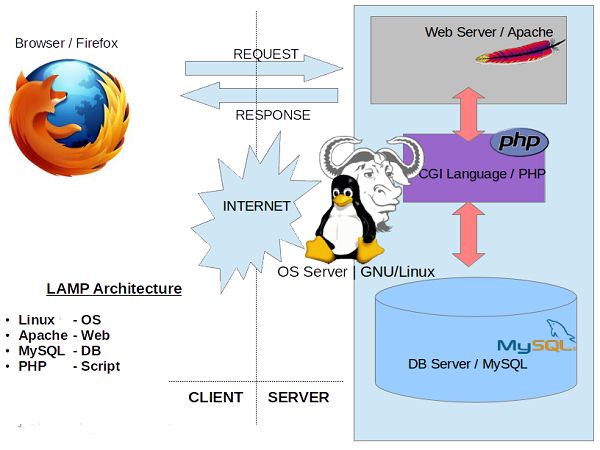If you have handled a project on web development, you must have encountered with the term LAMP Stack. What is it and why should a programmer bother to learn it?
Contents
What is a LAMP stack?
A stack is basically a bundle of different components that are brought together to form a unified platform designed to perform specific tasks. In most cases, stacks are named depending on the software that it contains. Typically, a stack consists of an operating system, programming language, web server, and database software.
In this case, LAMP is an acronym that stands for Linux, Apache HTTP server, MySQL, and PHP. It is the world’s most popular platform for web development.
LAMP Stack Components |
|
| Operating System | Linux-Based OS (Ubuntu, CentOS, Fedora etc.) |
| Web Server | Apache HTTP Server |
| DBMS | MySQL |
| Programming Language | PHP |
Working of LAMP stack technologies
Now that you know about the LAMP stack let’s go ahead and find out the reason why programmers should put some efforts to learn LAMP stack development.
Why Should you learn LAMP Stack development?
1. LAMP is everywhere
LAMP is one of those things that you cannot avoid as a developer. This is simply because it is everywhere. Every web hosting provider uses the original LAMP or some variation of this stack. As a programmer, your activities won’t be limited to the front end of a site. You would like to know what is happening in the back end of your site. You can only do so after learning the LAMP stack or any other alternative.
If you want to upgrade from the content management system to something that will give you full control, it will be necessary to learn LAMP stack.
2. It consists of the most popular technologies
Linux is the most popular operating system for web servers. Apache is the most popular web server ahead of NGINX. MySQL is used by almost half of the world’s websites and PHP has its monopoly as the most used back-end programming language for websites. Let’s have a look at the market share of each technology.
Market share of LAMP stack Component |
|
| Linux/Unix For Server | 69.3% [Source] |
| Apache Web Server | 44.1% [Source] |
| MySQL | 49.04% [Source] |
| PHP | 79.0% [Source] |
2. LAMP is an open source technology
In the programming world, there is always something attractive about open source technology. Anyone can use the resources available without any form of limitation. This is a major benefit that you will enjoy when you start using the LAMP stack. You won’t have to be subjected to many rules and catering for license costs.
One of the advantages of LAMP as an open source platform is it is usually updated on a regular basis. This means that the platform has advanced features that can deal with the latest security threats. It is easy to incorporate LAMP with modern web development features and designs.
3. Flexible and Easy to Customize
In most cases, programmers are the ones who are forced to change their requirements to meet certain features of the development platform. With LAMP, things are a little bit different. It can be easily customized and provides the highest levels of flexibility.
You can customize some components of LAMP to meet your specific programming needs. When it comes to flexibility, various components of LAMP can be easily exchanged with other open-source solutions whenever a need arises. This is because there are different variants for LAMP including AMP, WIMP, SAMP, and MAMP. These variants use different operating systems and some of them even have different database systems (MariaDB or MongoDB). You can also use Python, Pearl as a programming language.
4. LAMP is secure
Being open-source software, LAMP meets the highest security standards. Its security systems are usually updated to cope up with the latest security threats.
As a programmer, you will be able to develop your web application without worrying about many issues among them the security risks. Instead, you will put your energy on other key components of an application.
5. LAMP is scalable
LAMP stack is not limited by the size of the application that you are building. This is possible because the platform can accommodate any size of the web application.
LAMP can shrink or expand depending on the size and features of a web application.
6. Platform-independent
LAMP is not affected by the operating system. It can work on all major operating systems which are Windows, Linux, Android and iOS. This means that as a programmer, you won’t be forced into using a particular platform.
7. Supports agile software development
LAMP is an ideal platform for fast development. This is because it has many libraries which can be easily accessed. It also has a generous supply of frameworks that cut down the cost and time of software development process.
With the reasons that we have mentioned, I hope that you are now more convinced to learn LAMP stack.


